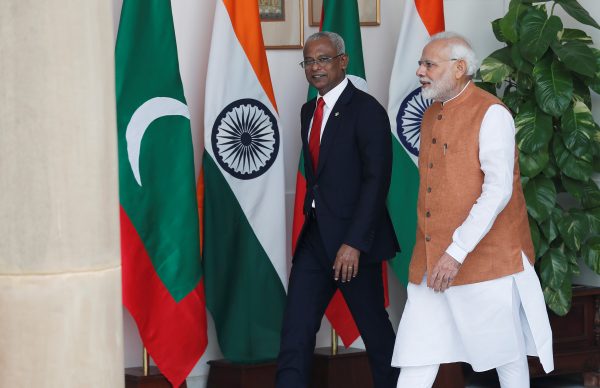The bilateral engagement confronted numerous challenges after the first democratically elected government of the Maldives led by Mohamed Nasheed collapsed in 2012. Since then the country’s political instability has challenged overall security of the Indian Ocean by increasing radicalisation —over 200 Maldivians reportedly joined the Islamic State —and by the granting of non-transparent permissions for foreign investment.
Indian Prime Minister Narendra Modi displeased the previous Maldivian government led by Abulla Yameen, in power from 2013 to 2018, by refusing to visit and his government calling for the release of political prisoners and improvements in the rule of law. The Maldives’ refusal to renew a contract of military helicopters gifted by India and trade diversification demonstrates its dissatisfaction.
But bilateral ties improved after the September 2018 elections ended the Abdulla Yameen government. Ibrahim Mohammed Solih, leader of the Maldives Democratic Party (MDP), was elected President with the support of a coalition. The change of government was welcomed by the international community and generated hopes for an end to corruption, political repression and human rights violations.
The change of government in the Maldives allowed both countries to positively redefine bilateral relationships, as indicated by high level visits. Modi visited the Maldives in September 2018 while Solih made a state visit to India in December 2018. Statements made during the visits underscore the importance of enhancing bilateral relations in trade, energy, security, connectivity, socio-economic developments and cooperation in regional and multilateral forums.
US$4 billion of financial assistance was announced by India for socio-economic development programs in Maldives in an attempt to improve relations. India also announced a US$800 million line of credit to finance infrastructure projects during the visit of External Affairs Minister Sushma Swaraj to the Maldives in March 2019. India’s aid to the Maldives increased from Rs 125 crore (US$18.1 million) in 2018–19 budget to Rs 575 crore (US$83.3 million)in 2019–20.
A visa facilitation agreement came into force in March 2019 to boost people to people contacts. Other important agreements include implementation of high-impact community development projects through local bodies and collaboration in energy efficiency, renewable energy, information and communications technology, and electronics.
Solih is speaking of an ‘India first’ policy while India is promoting a ‘neighbourhood first‘ policy. While these appear mutually agreeable, the challenge lies in implementing them, understanding each other’s security and strategic concerns and providing room for dialogue to address those concerns. India’s assistance in setting up a Coastal Surveillance Radar System and participating in the second Defence Cooperation Dialogue in January 2019 aims at cooperation on maritime security and counter terrorism. The Trilateral Maritime Agreement between India, Sri Lanka and the Maldives is in place and trilateral military exercises are held on a regular basis.
But to achieve greater results, both countries need to enhance regional cooperation by using common platforms such as the Indian Ocean RIM Association and the Indian Ocean Naval Symposium. Collaboration through the South Asian Association for Regional Cooperation is stalled due to India–Pakistan tensions.
The Maldives’ reliance on China to develop more than US$2.5 billion in infrastructure projects and the resulting accumulation of foreign debt— 40 per cent of the country’s GDP of US$4.866 billion in 2017— is a concern for India. The Maldives supports the Belt and Road Initiative (BRI) and its debt payment to China alone is close to US$3.4 billion. India is also concerned about any possible future use of civilian facilities for military purposes by China.
The Solih government’s foreign policy and internal political developments in the Maldives will play a role in determining the bilateral relations. The Maldives focusses on external relations to sustain its economy due to limited internal economic opportunities and dependence on imports for essential items. Demonstrating his willingness to engage with the world in a balanced manner, Solih reversed the Yameen government’s withdrawal from the Commonwealth and restored ties with Iran and Qatar. Solih will also not completely abandon China and has extended his support to the BRI.
Former president Nasheed has been vocal against China and Saudi Arabia’s role in the Maldives, but the country is nonetheless looking towards India and Japan for investments to reduce its dependence on China. Pakistan and the United States could also be major trade and development partners.
Internal political developments in the Maldives caused uncertainty for the Solih government. The coalition that brought Solih to power fell apart and contested separately in parliamentary elections that took place on 6 April 2018. The main MDP coalition partner — the Jumhoree Party — has aligned with Yameen’s Progressive Party of Maldives after Solih’s probing of corruption charges caused friction. Former president Yameen was detained on corruption charges and released. Solih was wary of a possible coup if the MDP failed to win a majority in Parliament.
But having won the parliamentary elections with landslide majority, the time is right for MDP to broaden the horizon of bilateral relations.
Samatha Mallempati is a research fellow at the Indian Council of World Affairs.

